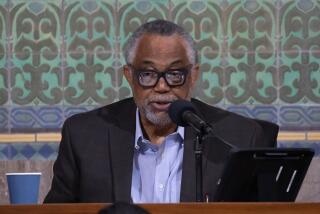Ex-Lawmaker Conroy Goes on Trial in Sexual Harassment Case
- Share via
SACRAMENTO — The sexual harassment trial of former Assemblyman Mickey Conroy got underway Wednesday as a fired aide accused him of demanding kisses and hugs her attorney said made the woman feel like “a trained dog.”
But the lawyer representing the three-term lawmaker said many of the most overt physical gestures never occurred or were misconstrued. Conroy’s accuser was dismissed because of budget cuts and poor performance, the lawyer said.
Robyn Boyd, 38, is suing Conroy, his chief of staff Pete Conaty and the state Assembly. She claims she was fired for complaining about an office environment that included profanity, sexual innuendo and unwanted physical advances by her bosses.
Conroy, an Orange County Republican, left office in November because of term limits. He was trounced in a bid for an Orange County Board of Supervisors seat after his opponent repeatedly brought up the harassment case.
Boyd, who worked for Conroy in 1993 as a $6-an-hour office assistant, testified that at one after-hours political function the lawmaker demanded a kiss from her and then declared to a male bystander that it was “a perk of office.”
“It was very degrading,” Boyd said, explaining that she feared for her job if she refused. “It felt like that was my value as an employee. I was one of the little perks.”
She said that at other times Conroy put his arm around her and allowed a hand to creep to the side of her breast. Afraid to say anything to her boss, she took to wearing thick sweaters, Boyd said.
Carolee Kilduff, Boyd’s lawyer, said during opening arguments that the case is about “some of the most powerful people in our state, the people who make our laws” and how they abused that power.
“They don’t understand the laws apply to them, not just the little people. They just don’t get it,” she said.
Kilduff said Boyd “feels degraded, she feels demeaned. She feels like a trained dog.”
Dennis Murphy, who is defending Conroy and the rest, countered during opening arguments that Boyd’s complaint led to corrections at the office to assuage her concerns. He also suggested that Conroy’s accuser was a troubled soul who wasn’t pulling her weight.
“Robyn Boyd regularly came in late,” Murphy said. “She often left early. She had many absences and made personal calls frequently. She didn’t get her work done.”
While acknowledging that Conroy hugged and kissed his staff members, Murphy denied that any kisses were on the mouth. He said that allegations of Conroy touching her breast are untrue, claiming that a diary Boyd kept of her experiences would prove that.
Murphy said the diary notes that Conroy would put his arm around her with his hand “nearly” touching her breast. “There’s a world of difference,” the defense attorney said, “between ‘nearly’ and touching.”
He said other young women who worked in the office would testify that they never witnessed anything untoward. The defense attorney described Conroy as “grandfatherly” and Conaty as a “down-to-earth office manager.”
The pair “ran a warm, friendly office that did include greetings and hugs and kisses on the cheek,” Murphy said.
He said Boyd was fired by Conroy because the office had budget cuts, could keep only full-time workers and Boyd wanted to work part time because of her children. Murphy pointed to a raise Boyd had gotten as well as a shift in her schedule to accommodate her children’s needs as proof that there was no retaliation for her May 1993 complaint.
Murphy also said Boyd suffered no economic damages because she was on paid leave until May 1994, was offered half a dozen other jobs by the Assembly and later got a higher-paying job outside the Legislature.
And the defense attorney suggested that Boyd had suffered “no emotional damage whatsoever” because of sexual harassment.
Instead, he said, her problems were at home, including a son with attention deficit disorder. During therapy sessions in 1993, Murphy said, Boyd rarely mentioned problems with her job, but instead talked of the stresses of children, her search for her birth mother and a dearth of time for herself.
During her testimony, however, Boyd said that she was a good employee who was rarely late for work and noted that Conaty and other staffers were more frequently tardy.
Her most sensational words were about the harassment she claimed to have endured for months before complaining.
Boyd said another female employee had a sign posted over her desk saying: “Sexual harassment in this area will not be reported, however it will be graded.”
Her attorney asked the jury to “please think about whether this was a joke or the office motto.”
A few months later, a “Sexual Harassment Consent Form” was distributed to everyone in the office as a joke, Boyd said.
Kilduff described Boyd, 38, as an outgoing “people person” eager to start at the bottom and begin rising up the hierarchy.
Boyd said she was told to pamper her boss.
“I was told that I needed to keep him company [and] make him feel special,” Boyd said. “I was told to give him a little back rub now and then, give him a hug and kiss.”
While walking to political functions, Conroy would put his arms around Boyd and another female employee and call them “his bookends,” she said. On one occasion, he asked if they should get “one room or two,” Boyd said.
“It was so inappropriate for a boss to say that to an employee. I thought, gosh, what is he testing the water or what?”
More to Read
Sign up for Essential California
The most important California stories and recommendations in your inbox every morning.
You may occasionally receive promotional content from the Los Angeles Times.










